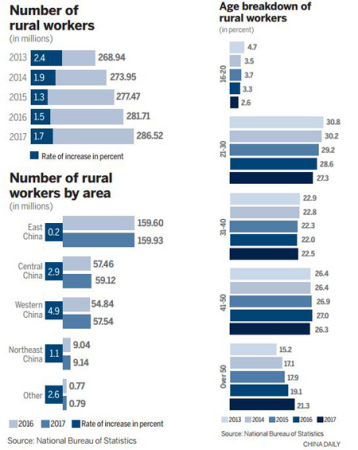
Hubei, for example, helped 475,000 children from migrant families enroll in schools in 2016 and contributed to their tuition to ensure they had access to China's nine-year compulsory education system, Hubei Daily reported.
The report said provincial authorities invested 45.7 million yuan ($7.18 million) to set up care centers in 457 towns for children who remain in villages while their parents work in cities.
Hunan also has promoted programs aimed at boosting migrant laborers' professional skills and knowledge, including occupational safety, and last year the province included them in its lifelong vocational training system.
The growing appeal of western China-chiefly driven by Sichuan and Chongqing-has seen it outstrip other regions in the past two years in rural workforce growth. In 2017, the number increased to 57.54 million, up 4.9 percent year-on-year.
"These days, areas like Sichuan and Chongqing are performing much better than eastern and Central China in economic development, and that's brought more job opportunities," Yang said.
Salaries in the western region are also quickly catching up with the eastern and southern coasts, according to Zhang at the CASS. "The income gap is not that large anymore, but living costs in the west are still lower. It's something migrant workers will consider," he said.
Last year, the average monthly salary in the western region was 3,350 yuan, up 7.5 percent year-on-year, while for the eastern region it was 3,677 yuan, according to the National Bureau of Statistics.
Meanwhile, Kunming, Xi'an, Yinchuan and Xining-all capitals in western China-were ranked among the top-six cheapest places to live in the 2016 Blue Book on Quality of Life in Cities. The traditional destinations for migrant labor-Shenzhen, Beijing, Shanghai and Guangzhou-were the most expensive.
Wang Gangxian, 25, used to lug bricks and mix cement on construction sites in Hangzhou, capital of Zhejiang province, but returned to work in his native Kunming, capital of Yunnan province, in March.
"I'm more familiar with this place," he said, plus he can earn as much as 3,000 yuan a month, only about 500 yuan less than he did in Hangzhou. "Fortunately, bosses in both cities have taken care of my accommodations, but in Kunming I save about 700 yuan on food and daily necessities," he added.


















































